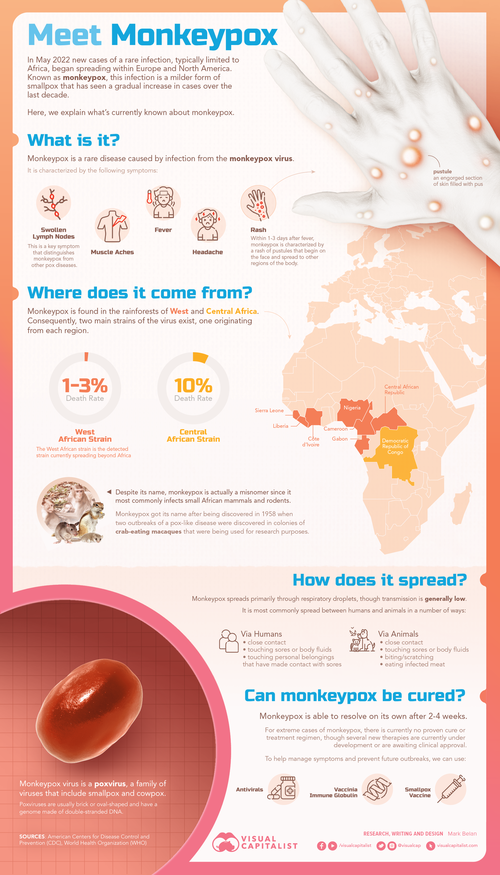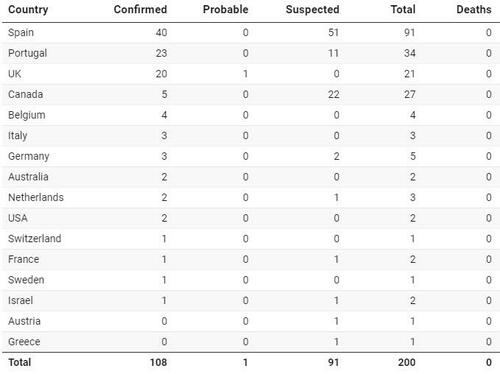
With the COVID-19 pandemic still fresh in the minds of the people around the world, it comes as no surprise that recent outbreaks of another virus are grabbing headlines.
Monkeypox outbreaks have now been reported in multiple countries, and it has scientists paying close attention. For everyone else, numerous questions come to the surface:
-
How serious is this virus?
-
How contagious is it?
-
Could Monkeypox develop into a new pandemic?
Below, Visual Capitalist's Nick Routely and Mark Belan answer these questions and more.
What is Monkeypox?
Monkeypox is a virus in the Orthopoxvirus genus which also includes variola virus (which causes smallpox) and cowpox virus. The primary symptoms include fever, swollen lymph nodes, and a distinctive bumpy rash.
There are two major strains of the virus that pose very different risks:
-
Congo Basin strain: 1 in 10 people infected with this strain have died
-
West African strain: Approximately 1 in 100 people infected with this strain died
At the moment, health authorities in the UK have indicated they’re seeing the milder strain in patients there.
Where did Monkeypox Originate From?
The virus was originally discovered in the Democratic Republic of Congo in monkeys kept for research purposes (hence the name). Eventually, the virus made the jump to humans more than a decade after its discovery in 1958.
It is widely assumed that vaccination against another similar virus, smallpox, helped keep monkeypox outbreaks from occurring in human populations. Ironically, the successful eradication of smallpox, and eventual winding down of that vaccine program, has opened the door to a new viral threat. There is now a growing population of people who no longer have immunity against the virus.
Now that travel restrictions are lifting in many parts of the world, viruses are now able to hop between nations again. As of the publishing of this article, a handful of cases have now been reported in the U.S., Canada, the UK, and a number of European countries.
On the upside, contact tracing has helped authorities piece together the transmission of the virus. While cases are rare in Europe and North America, it is considered endemic in parts of West Africa. For example, the World Health Organization reports that Nigeria has experienced over 550 reported monkeypox cases from 2017 to today. The current UK outbreak originated from an individual who returned from a trip to Nigeria.
Could Monkeypox become a new pandemic?
Monkeypox, which primary spreads through animal-to-human interaction, is not known to spread easily between humans. Most individuals infected with monkeypox pass the virus to between zero and one person, so outbreaks typically fizzle out. For this reason, the fact that outbreaks are occurring in several countries simultaneously is concerning for health authorities and organizations that monitor viral transmission. Experts are entertaining the possibility that the virus’ rate of transmission has increased.
Images of people covered in monkeypox legions are shocking, and people are understandably concerned by this virus, but the good news is that members of the general public have little to fear at this stage.
I think the risk to the general public at this point, from the information we have, is very, very low.
–TOM INGLESBY, DIRECTOR, JOHNS HOPKINS CENTER FOR HEALTH SECURITY
Finally, as Infectious Disease expert Muge Cevik notes in a detailed Twitter thread, as the monkeypox virus (MPX) outbreak continues, a lot of data emerging in real-time & being rapidly disseminated (as well as misinformation).
Confirmed and suspected cases of #MonkeyPox now reached 200 among 14 countries with 20 confirmed cases in the UK.
The main concern is that there are non-travel associated cases in Europe, meaning there is likely unnoticed community transmission.
This is the biggest outbreak outside of Africa, and there will be more cases to come. The concern is not necessarily a global pandemic like what we’ve seen w/ coronaviruses or influenza. But a growing & large MPX epidemic is a concern especially if PH measures are delayed.
So, the most important thing is to inform our communities & healthcare workers about the clinical presentation, incubation period, so that people can be diagnosed at an earlier possibility, isolated and contacts are protected. This is the range of skin lesions.
In conclusion, monkeypox is not really a rare disease & is a public health concern.
According to prelim evidence there is no indication that current outbreak is due to a new MPX variant & epidemiological data suggest that it’s been introduced to male-to-male sexual networks, likely sometime in late-April.
We have observed MXP outbreaks in many countries mainly in Africa, this is the first time that we are observing wide transmission in Europe. MPX remains an under-recognized and underreported emerging disease. Good clinical management can limit disease severity or death.
We are in an unknown territory as individuals who have prior smallpox vaccination do have some degree of protection against monkeypox, but we don’t really know the degree of protection it provides to individuals who had vaccination 50, 60 years prior.
With the COVID-19 pandemic still fresh in the minds of the people around the world, it comes as no surprise that recent outbreaks of another virus are grabbing headlines.
Monkeypox outbreaks have now been reported in multiple countries, and it has scientists paying close attention. For everyone else, numerous questions come to the surface:
-
How serious is this virus?
-
How contagious is it?
-
Could Monkeypox develop into a new pandemic?
Below, Visual Capitalist’s Nick Routely and Mark Belan answer these questions and more.
What is Monkeypox?
Monkeypox is a virus in the Orthopoxvirus genus which also includes variola virus (which causes smallpox) and cowpox virus. The primary symptoms include fever, swollen lymph nodes, and a distinctive bumpy rash.
There are two major strains of the virus that pose very different risks:
At the moment, health authorities in the UK have indicated they’re seeing the milder strain in patients there.
Where did Monkeypox Originate From?
The virus was originally discovered in the Democratic Republic of Congo in monkeys kept for research purposes (hence the name). Eventually, the virus made the jump to humans more than a decade after its discovery in 1958.
It is widely assumed that vaccination against another similar virus, smallpox, helped keep monkeypox outbreaks from occurring in human populations. Ironically, the successful eradication of smallpox, and eventual winding down of that vaccine program, has opened the door to a new viral threat. There is now a growing population of people who no longer have immunity against the virus.
Now that travel restrictions are lifting in many parts of the world, viruses are now able to hop between nations again. As of the publishing of this article, a handful of cases have now been reported in the U.S., Canada, the UK, and a number of European countries.
On the upside, contact tracing has helped authorities piece together the transmission of the virus. While cases are rare in Europe and North America, it is considered endemic in parts of West Africa. For example, the World Health Organization reports that Nigeria has experienced over 550 reported monkeypox cases from 2017 to today. The current UK outbreak originated from an individual who returned from a trip to Nigeria.
Could Monkeypox become a new pandemic?
Monkeypox, which primary spreads through animal-to-human interaction, is not known to spread easily between humans. Most individuals infected with monkeypox pass the virus to between zero and one person, so outbreaks typically fizzle out. For this reason, the fact that outbreaks are occurring in several countries simultaneously is concerning for health authorities and organizations that monitor viral transmission. Experts are entertaining the possibility that the virus’ rate of transmission has increased.
Images of people covered in monkeypox legions are shocking, and people are understandably concerned by this virus, but the good news is that members of the general public have little to fear at this stage.
I think the risk to the general public at this point, from the information we have, is very, very low.
–TOM INGLESBY, DIRECTOR, JOHNS HOPKINS CENTER FOR HEALTH SECURITY
Finally, as Infectious Disease expert Muge Cevik notes in a detailed Twitter thread, as the monkeypox virus (MPX) outbreak continues, a lot of data emerging in real-time & being rapidly disseminated (as well as misinformation).
Confirmed and suspected cases of #MonkeyPox now reached 200 among 14 countries with 20 confirmed cases in the UK.
The main concern is that there are non-travel associated cases in Europe, meaning there is likely unnoticed community transmission.
This is the biggest outbreak outside of Africa, and there will be more cases to come. The concern is not necessarily a global pandemic like what we’ve seen w/ coronaviruses or influenza. But a growing & large MPX epidemic is a concern especially if PH measures are delayed.
So, the most important thing is to inform our communities & healthcare workers about the clinical presentation, incubation period, so that people can be diagnosed at an earlier possibility, isolated and contacts are protected. This is the range of skin lesions.
In conclusion, monkeypox is not really a rare disease & is a public health concern.
According to prelim evidence there is no indication that current outbreak is due to a new MPX variant & epidemiological data suggest that it’s been introduced to male-to-male sexual networks, likely sometime in late-April.
We have observed MXP outbreaks in many countries mainly in Africa, this is the first time that we are observing wide transmission in Europe. MPX remains an under-recognized and underreported emerging disease. Good clinical management can limit disease severity or death.
We are in an unknown territory as individuals who have prior smallpox vaccination do have some degree of protection against monkeypox, but we don’t really know the degree of protection it provides to individuals who had vaccination 50, 60 years prior.









